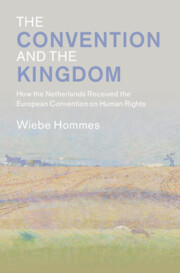Chapter 2 - 1954–1962
The Open Beginning of the Convention
Published online by Cambridge University Press: 08 August 2025
Summary
Chapter 2 turns to the period directly after ratification, from 1954 to 1962, and shows how this was a remarkable lively period.
It makes two distinct claims. First, it contests the pervasive image that the Convention was ‘asleep’ in the domestic legal context. Rather, the Convention was immediately tried and tested and entered the domestic context in a flurry of heated activity, as litigants and other players set out their campaigns to define what the Convention would mean.
Second, it argues that the restrictive policy of the European Commission of Human Rights was a conscious legal strategy. Following the experiences of the Dutch member of the Commission and the national interaction with the European institutions, it can be argued how restraint was indeed part of a conscious effort to let states accept the right of individual petition. Simultaneously, however, the European Court embarked on campaigns to make the Court relevant.
The chapter ends in 1962 with failure on both the domestic and the European levels to make the Convention into something more than a distant document. These failures were essential in setting the stage for the Convention’s perceived legal irrelevance in the following two decades.
Keywords
Information
- Type
- Chapter
- Information
- The Convention and the KingdomHow the Netherlands Received the European Convention on Human Rights, pp. 66 - 120Publisher: Cambridge University PressPrint publication year: 2025
Accessibility standard: WCAG 2.0 A
Content Navigation
Allows you to navigate directly to chapters, sections, or non‐text items through a linked table of contents, reducing the need for extensive scrolling.
Provides an interactive index, letting you go straight to where a term or subject appears in the text without manual searching.
Reading Order & Textual Equivalents
You will encounter all content (including footnotes, captions, etc.) in a clear, sequential flow, making it easier to follow with assistive tools like screen readers.
You get concise descriptions (for images, charts, or media clips), ensuring you do not miss crucial information when visual or audio elements are not accessible.
Structural and Technical Features
You gain clarity from ARIA (Accessible Rich Internet Applications) roles and attributes, as they help assistive technologies interpret how each part of the content functions.
